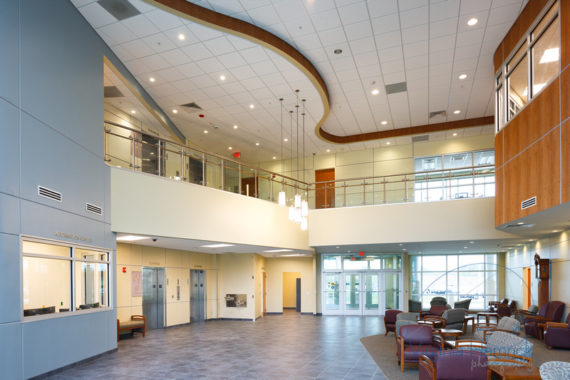
(State photo of Western State Hospital Lobby.)
(7-12-21) Are staff shortages at mental health hospitals in your state causing officials to stop admissions?
It’s happening in Virginia and it’s shameful.
The current crisis is related to staffing, but one of the contributing factors is the irresponsible actions of private hospitals. In 2014, the state passed a law in reaction to the horrific 2013 death of “Gus” Deeds, the son of state Sen. Creigh Deeds who rushed his son to a local mental health center only to be told no local state hospital beds were available. Gus attacked his father with a knife at home before taking his own life. Because of that incident, Virginia declared that state mental hospitals can not turn away anyone in crisis.
Unfortunately, greedy private hospital administrators have taken advantage of the law to empty their psychiatric wards to save money. Generally, psychiatric beds lose money. I heard of one incident where a hospital sent a psychiatric patient to the state hospital because she had an UTI and it simply wanted to get rid of her. As this article reprinted from The Washington Post shows, hospitals also do not want to deal with any psychiatric patient who is seen as threatening. Yet, because our state demands that an individual be threatening before they can be involuntarily admitted, hospitals can refuse to accept them.
Virginia orders 5 state mental hospitals to stop taking new admissions amid staffing crisis
“The result is a dangerous environment where staff and patients are at increasing risk for physical harm and where effective treatment to help patients recover is much harder to deliver,” Land wrote.
There are on average 4 1/2 incidents or injuries to employees or patients every day across state psychiatric facilities, with 63 serious injuries since July 1, she said.
New admissions are closed at Catawba Hospital, Central State Hospital, Eastern State Hospital, Piedmont Geriatric Hospital and Western State Hospital, Land wrote in her letter, while Northern Virginia Mental Health Institute, Southern Virginia Mental Health Institute and Southwestern Virginia Mental Health Institute can continue to accept patients.
The letter comes as state lawmakers prepare to convene for a special session in August to decide how to spend the first tranche of more than $4 billion — Virginia’s share of American Rescue Plan Act money — to help the economy recover and make investments for the future.
Gov. Ralph Northam (D), a pediatric neurologist, will propose devoting a “significant amount” of the federal funding to increasing salaries, hiring workers and taking other actions to ensure the well-being of patients and employees at the mental health hospitals, spokeswoman Alena Yarmosky said.
Lawmakers have been meeting for weeks to come up with proposals for how to use the money for mental health and have discussed staff bonuses, expanding loan forgiveness programs in exchange for working in an underserved area and funding crisis centers as alternatives to emergency rooms and jails for people in crisis.
“We are in a desperate situation,” he said. “I get why admissions had to be closed. I’m frustrated and saddened by it, but we’ll do what it takes to fix the issue.”
Anna Mendez, board president of the nonprofit advocacy group Mental Health America of Virginia and executive director of the Charlottesville affiliate, Partner for Mental Health, attributed the bed shortage, in part, to years of inadequate funding of community-based mental health services leading to an overreliance on inpatient treatment.
Virginia should “double its mental health care spending, bringing it into to the top 10 in the nation, so that our commonwealth can better support its residents with mental illness and crises like these can be prevented in the future,” she said.
The Commonwealth Center for Children and Adolescents, which treats minors in Staunton, has a 57 percent job vacancy in direct patient care positions, which has caused the 48-bed facility to go down to just 18 beds, Jaime Bamford, the medical director at CCCA, said.
The center has seen increased aggression, suicidal thoughts and attempts, and psychosis as well as substance abuse and other behaviors among its patients, exacerbated by the isolation and stress of the pandemic, she said.
“It’s a really critical time for CCCA in providing safe supervision for the children in our care,” Bamford said in an interview Friday.
A report by the Centers for Disease Control and Prevention released last month found across the United States, adolescent girls’ visits to emergency departments for suicide attempts increased by about 50 percent from the early months of 2019 to the same period this year.
A spokeswoman for Land did not respond to a request for comment on whether Land’s letter exempts the state psychiatric hospitals from a rule that says the facilities must provide the “bed of last resort” for involuntary detention if a bed cannot be found elsewhere.
Northam last summer signed an executive order pausing the rule because of the pandemic, but the order expired on June 30 after the coronavirus state of emergency lifted.
In her letter, Land called on private hospitals to admit more challenging cases given the dire staffing shortages at the public facilities.
In response to the letter, Julian Walker, a spokesman for the Virginia Hospital and Healthcare Association, said bed shortages mean people with acute psychiatric needs wait in emergency departments for hours or days, delaying care to other people.
“The challenges of this have ripple effects that can be felt across the continuum of care throughout the public health and private health system,” he said.
Private hospitals are facing similar challenges, such as staffing shortages — meaning it wouldn’t be safe for them to take in certain patients, either, Walker said.
“We continue to see an increase in demand for these services . . . and this situation unfortunately may get worse before it gets better,” he said.




